|
|
|
Sort Order |
|
|
|
Items / Page
|
|
|
|
|
|
|
| Srl | Item |
| 1 |
ID:
128430
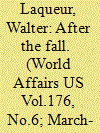

|
|
|
|
|
| Publication |
2014.
|
| Summary/Abstract |
As the Soviet Union disintegrated, ending on the ash heap of history in 1989-91, all the institutes for the study of Marxism-Leninism that had justified the regime, the collected and selected works of the communist classics, and the Marxism chairs in academies and universities also disappeared. From this void emerged a burning question: What was the raison d'être of the existing political system? And later, how did the new regime justify itself in the field of foreign and domestic affairs, and what was its social and economic policy? For the answers, Vladimir Putin and his followers went back to the future. Russia's official ideology prior to 1917 was Pravoslavie, Samoderzhavie,Narodnost, which has been translated as Orthodoxy, Autocracy, Nationality. This statement was made first by Sergei Uvarov, the Russian minister of education, in a circular letter in 1833. Uvarov was a learned man who also served as president of the Russian Academy of Sciences. No one had asked Uvarov to prepare such an official binding declaration. However, Czar Nicholas I liked this "triad," as it was called, even though its meaning was by no means always clear.
|
|
|
|
|
|
|
|
|
|
|
|
|
|
|
|
| 2 |
ID:
133639


|
|
|
|
|
| Publication |
2014.
|
| Summary/Abstract |
IN A FAMOUS exchange in 1994, Michael Ignatieff asked Eric Hobsbawm whether the vast human costs inflicted by Stalin on the Soviet Union could possibly be justified. Hobsbawm replied, "Probably not. . . . because it turns out that the Soviet Union was not the beginning of the world revolution. Had it been, I'm not sure." Do you mean, Ignatieff pressed him, that "had the radiant tomorrow actually been created, the loss of fifteen, twenty million people might have been justified?" Hobsbawm answered, "Yes."
|
|
|
|
|
|
|
|
|
|
|
|
|
|
|
|
| 3 |
ID:
128223
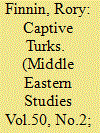

|
|
|
|
|
| Publication |
2014.
|
| Summary/Abstract |
It has become accepted that, during the Soviet period, Turkey 'ignored the plight' of the Crimean Tatars, who were brutally deported to Central Asia by Stalin in 1944. This narrative of Turkish indifference with respect to the Crimean Tatar 'question' overlooks a corpus of material that tells something of a different story. This corpus is literary. The Crimean Tatars figured centrally in Pan-Turkist poems and pulp fiction novels as protagonists whose victimization by the Communist regime was represented in order to provoke outrage and action, not silence and passivity. These literary texts seek to elicit in the reader what can be called ' irredentist solidarity , a convergence of fellow-feeling that involves a total identification of the Other as the same.
|
|
|
|
|
|
|
|
|
|
|
|
|
|
|
|
| 4 |
ID:
134098
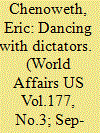

|
|
|
|
|
| Publication |
2014.
|
| Summary/Abstract |
Twenty-five years ago, breakthrough elections were held in Poland that led, within three months, to the downfall of that country's communist regime. The events helped to spark the Velvet Revolutions that spread, within the next six months, to Budapest, Prague, Bratislava, Berlin, Sofia, Timisoara, and many other major cities, as masses of people went to the streets to demand their rights, oppose Soviet occupation, and win back their freedom. Communist despotisms that had lasted more than four decades collapsed like a house of cards. The world celebrated the fall of communism and the victory of democracy.
|
|
|
|
|
|
|
|
|
|
|
|
|
|
|
|
| 5 |
ID:
133160
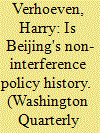

|
|
|
|
|
| Publication |
2014.
|
| Summary/Abstract |
The rapid intensification of ties between the People's Republic of China (PRC) and Africa's 54 countries is of considerable geopolitical significance. It is impossible to understand how the PRC has sustained year-on-year breathtaking growth without factoring in the contribution of African commodity exports and the profits reaped by Chinese enterprises through African demand for consumer goods, construction projects, and information and communication technology services. An extensive literature analyses the China-Africa story: an initial shouting match pitted those who cast Beijing as leading the re-colonization of the continent1 against authors praising China as Africa's savior at a time when the West would only engage through the lens of the Global War on Terror and rock star-driven charity.2 In recent years, a more nuanced conversation has underscored historical dimensions to the China-Africa relationship, exploring change and continuity in Africa's place in the global political economy, and deconstructing the myth that all Chinese actors-such as PRC embassies, state-owned enterprises, private firms, and migrating individuals-share a unity of purpose, guided by a grand plan hatched by the Chinese Communist Party.3
|
|
|
|
|
|
|
|
|
|
|
|
|
|
|
|
| 6 |
ID:
132938
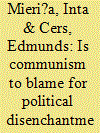

|
|
|
|
|
| Publication |
2014.
|
| Summary/Abstract |
In this article, we apply a new, original technique of cohort analysis to test empirically whether political disenchantment in the post-communist countries of Central and Eastern Europe can be linked to the previous political culture. On the basis of International Social Survey Programme 1996 and 2006 data we find a surprisingly similar and unique cohort effect in all analysed post-communist countries, reflecting persistent generational differences in perceived political competence (interest and understanding of political processes). However, the communist legacy does not seem to be important for explaining low self-efficacy or distrust in political authorities and their responsiveness to citizens' demands.
|
|
|
|
|
|
|
|
|
|
|
|
|
|
|
|
| 7 |
ID:
139273
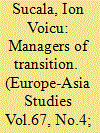

|
|
|
|
|
| Summary/Abstract |
The article presents the perspectives of managers as part of the Romanian organisational elite on the communist regime and on the transition period, and the values and principles that informed their behaviour as managers in each period. For the first decade after the end of communist rule, managers were drawn mainly from the second level of management of the state-owned enterprises of communist times. As a group they had been selected and formed in late communism. Among the main advantages of this social group were that they demonstrated considerable survival capacity, ideological neutrality and an ability to manoeuvre in a turbulent environment. On the other hand they had to adapt to their new environment drawing on the skills and mentality they had developed under the old regime. The research employed a qualitative method based on the interpretation of conversations between managers and students.
|
|
|
|
|
|
|
|
|
|
|
|
|
|
|
|
| 8 |
ID:
129462
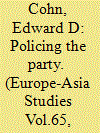

|
|
|
|
|
| Publication |
2013.
|
| Summary/Abstract |
During the late Stalin era, many of the USSR's local party control officials and prosecutors entered into a protracted conflict over who had the right to judge the conduct of communists; prosecutors charged that party committees were shielding communists from prosecution, while control officials claimed that party organs were deferring to prosecutors and abandoning their traditional oversight role. This article will argue that although some party committees were interfering in the courts, the dominant story of party-procuracy relations under post-war Stalinism involved the disengagement of party organs from the oversight of administrative wrongdoing, with long-lasting consequences for the Soviet regime's attitude toward corruption.
|
|
|
|
|
|
|
|
|
|
|
|
|
|
|
|
| 9 |
ID:
118429
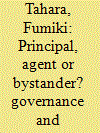

|
|
|
|
|
| Publication |
2013.
|
| Summary/Abstract |
What does 'local self-governance' mean in post-communist Russia and China? In order to answer this question, the article focuses on village-level governance in both countries by employing a four-fold typology of village leadership in public affairs. In both countries, the withdrawal of state power from local communities and the introduction of legislative 'self-government' has not brought autonomy to the local and community levels. The findings here suggest that the single 'state agent' category of village leadership that emerged under the communist regime is shifting to become one of the remaining three types, 'principal', 'local agent' and 'bystander'. There was a growing tendency towards a non-autonomous type of 'bystander'-style leadership in China and the 'local agent' type in Russia. This article suggests that the development of these local governance styles should not be attributed to a common transitional process departing from the communist past, but is the outcome of four factors that influence village leaders in two countries: administrative distance between local and village level, village social structure, fiscal arrangements and electoral relationships.
|
|
|
|
|
|
|
|
|
|
|
|
|
|
|
|
| 10 |
ID:
118431
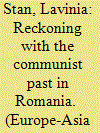

|
|
|
|
|
| Publication |
2013.
|
| Summary/Abstract |
During the first two decades following the collapse of the communist regime, Romania has reckoned with the human rights infringements perpetrated from 1945 to 1989 with the help of a range of official and unofficial, judiciary and non-judiciary, backward- and forward-looking methods pursued by a variety of state and non-state actors. This article summarises the progress registered to date in court trials, lustration, access to secret files, property restitution, the truth commission, rehabilitation of former political prisoners, compensation to victims and their descendants, the opinion tribunal, forensic investigations, rewriting history books, unofficial truth projects and memorialisation.
|
|
|
|
|
|
|
|
|
|
|
|
|
|
|
|
| 11 |
ID:
133818
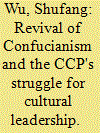

|
|
|
|
|
| Publication |
2014.
|
| Summary/Abstract |
The revival of Confucianism in the first decade of the twenty-first century is a political phenomenon that cannot be ignored with regard to its social influence and the particular meaning it has brought to China. However, so far, there has not been much academic research into the political reasons for this revival at a deeper level. Based on the 228 articles published in the People's Daily in the years between 2000 and 2009, a content analysis is conducted on how Confucianism was represented in this authoritative official medium. The examination of the role that Confucianism plays in the construction of the socialist 'advanced culture' provides a clear lens to observe the role of Confucianism in the Chinese political ideology, which is still rooted and based on Marxism-Leninism. This research is aimed at clarifying how Confucianism was pragmatically promoted by the government of the Chinese Communist Party (CCP) with the purpose of securing its cultural leadership. This state-led promotion reveals the vulnerability of the political status of Confucianism in contemporary China and its unsecured future.
|
|
|
|
|
|
|
|
|
|
|
|
|
|
|
|
| 12 |
ID:
079338
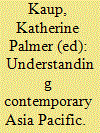

|
|
|
|
|
| Publication |
Boulder, Lynne Rienner Publishers, 2007.
|
| Description |
xv, 473p.hbk
|
| Standard Number |
9781588260864
|
|
|
|
|
|
|
|
|
|
|
|
Copies: C:1/I:0,R:0,Q:0
Circulation
| Accession# | Call# | Current Location | Status | Policy | Location |
| 052666 | 950.43/KAU 052666 | Main | On Shelf | General | |
|
|
|
|
| 13 |
ID:
131949
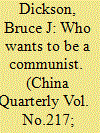

|
|
|
|
|
| Publication |
2014.
|
| Summary/Abstract |
This article analyses trends in the Chinese Communist Party's recruitment strategy and the composition of Party members. Based on original survey data, it analyses the motives for joining the CCP, the consequences on career mobility, and the effects of Party membership on political beliefs and behaviour in contemporary China. These data reveal three key findings. First, for those who aspire to positions in the Party/government bureaucracy or SOEs, Party membership is a necessary, if not sufficient, condition; for those in the non-state sector, it is youth and college education that are the keys to top jobs, and not Party membership. Second, CCP members are more likely to donate time, money, and even blood, for various causes, and to vote in local people's congress elections. This behaviour demonstrates mobilized loyalty: the CCP mobilizes its members to participate in these activities to demonstrate their loyalty to the regime and to serve as examples to the rest of the population. Third, Party members are not more likely to support and trust their state institutions: while they do have higher levels of support for the centre than the rest of population generally, Party membership does not produce increased support for the local state. Nor does economic development: all else being equal, support for central and local party-state institutions is lower in the most developed cities. These findings call into question the Party's recruitment and development policies, as well as the conventional wisdom on the link between economic development and popular support for the status quo.
|
|
|
|
|
|
|
|
|
|
|
|
|
|
|
|
|
|
|
|
|